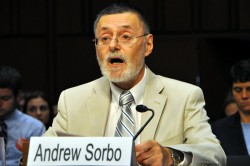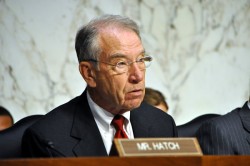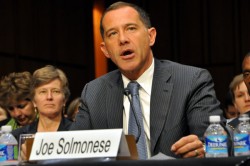National
Couples make history testifying against DOMA
Senate hears from spouses, activists about burdens of marriage ban; hearing first-ever in Congress on repeal of anti-gay law
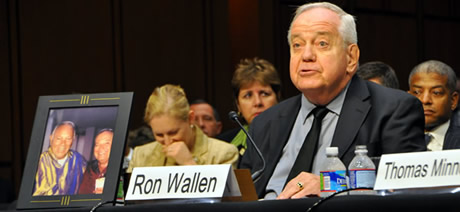
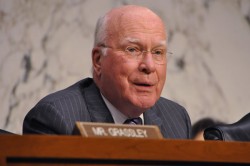
‘The time has come for the federal government to recognize that these married couples deserve the same legal protections afforded to opposite-sex married couples,’ said Sen. Patrick Leahy (D-Vt.) (Washington Blade photo by Michael Key)
A Senate hearing Wednesday on repealing the Defense of Marriage Act featured poignant testimony from couples in same-sex marriages, who described how the anti-gay law has harmed them.
The hearing, which took place before the Senate Judiciary Committee, was the first ever before Congress on repeal of DOMA, the 1996 law prohibiting federal recognition of same-sex marriage. The hearing was intended to highlight the Respect for Marriage Act, legislation pending before Congress that would repeal DOMA.
Ron Wallen, an Indio. Calif., resident, who married his partner of 55 years in 2008, said he’s unable to make payments on his home following the death of his spouse, Tom Carrollo, four months ago. Had he been in an opposite-sex marriage, he would have been able to receive Social Security benefits to help pay for the cost of living.
“I am selling the last house I shared with my husband in a panic sale because I can’t afford the mortgage and expenses,” Wallen said. “I am spending my days and nights sorting through our possessions, packing boxes to move — even while I am still answering the condolence cards that come in the mail.”
Susan Murray, who lives in Ferrisburgh, Vt., with her spouse, Karen Murray, said she also faces financial inequities as a result of DOMA. Murray was the co-counsel in the lawsuit Baker v. Vermont, which established civil unions in Vermont in 2000.
One issue Murray cited was the additional tax that she and her spouse have to pay on employer-based insurance coverage provided to them through her spouse’s employer, Fletcher Allen Health Care.
“Because of DOMA, I am not considered Karen’s spouse, so the value of that health insurance coverage for me ($6,200 a year) is considered taxable income to Karen,” Murray said. “She therefore has to pay income tax, as well as FICA and Medicare tax, on that ‘phantom’ income — unlike her other married colleagues.”
Andrew Sorbo, a Cheshire, Conn., resident and retired history teacher, also testified about financial troubles he faced after his spouse, Colin Atterbury, died of pancreatic cancer in 2009. Among other things, Sorbo said he was denied the right to be included in his deceased spouse’s medical insurance plan through the federal government.
“When I retired as a teacher in 2005, I had no alternative except to pay for my insurance coverage in full through my former school district, at a much higher cost than if I could have been covered under Colin’s plan as a spouse,” Sorbo said. “Last year, my insurance payments consumed almost a third of my $24,000 teacher pension.”
Sen. Patrick Leahy (D-Vt.), chair of the committee, spoke out in his opening statement for passage of the Respect for Marriage Act and said it would allow same-sex couples married under state law to receive federal benefits.
“Nothing in this bill would obligate any person, religious organization, state, or locality to perform a marriage between two persons of the same sex,” Leahy said. “What would change, and what must change, is the federal government’s treatment of state-sanctioned marriage. The time has come for the federal government to recognize that these married couples deserve the same legal protections afforded to opposite-sex married couples.”
Sen. Dianne Feinstein (D-Calif.), sponsor of the DOMA repeal legislation, maintained that the anti-gay law should be off the books because marriage, as well as other issues related to family such as adoption and divorce, have been under the jurisdiction of state law.
“Family law has traditionally been the preserve of state law,” Feinstein said. “The single exception is DOMA. Chief Justice [William] Rehnquist once wrote that family law ‘has been left to the states from time immemorial, and not without good reason.’ He was right.”
Passed by Congress in 1996, DOMA was signed into law by President Clinton. Both Clinton and the bill’s sponsor at the time, former Republican Rep. Bob Barr, have come out for repeal of the law.
DOMA has two components: one that prohibits the federal government from recognizing same-sex marriage and another that allows states not to recognize such marriages performed in other jurisdictions.
As a result of the component of DOMA known as Section 3, married same-sex couples cannot participate in federal programs. For instance, they can’t file joint federal income taxes, receive spousal benefits under Social Security or obtain exemptions of the estate tax law upon the death of one of the spouses.
Sen. Chuck Schumer (D-N.Y.), who represents a state where same-sex marriage will be available next week, emphasized the fiscal reasons for repealing DOMA and predicted that lifting the anti-gay law from the books “would, on balance, likely increase federal revenue.”
According to Schumer, in 2004 the Congressional Budget Office found that DOMA repeal at the time would have increased revenues by less than $400 million a year from 2005 through 2010, and by $500 million to $700 million annually from 2011 through 2014.
“I think that there are three fundamental principles at stake here,” Schumer continued. “Repealing DOMA makes good fiscal sense, it respects states’ rights to make their own determinations about marriage, and it treats all married people the same. It’s fair, it makes sense, and it’s time.”
The sole committee member to speak out against DOMA repeal during the hearing was Sen. Charles Grassley (R-Iowa), ranking Republican on the committee.
Grassley, who represents a state where same-sex marriage is legal, said he opposes the Respect for Marriage Act because he believes marriage should be reserved for one man and one woman.
“The bill before us today is entitled the Respect for Marriage Act,” Grassley said. “George Orwell would have marveled at the time. A bill to restore marriage would restore marriage as it has been known — one man, one woman. That is the view of marriage that I support. This bill would undermine, not restore marriage by repealing it.”
Grassley and Sen. Orrin Hatch (R-Utah) were the only Republican senators who made an appearance at the DOMA hearing. Grassley was the only GOP committee member who asked questions of the witnesses.
Witnesses who married someone of the same-sex testified about how DOMA negatively affected their relationship or their ability to receive benefits after the death of their spouse.
The hearing took place on the heels of an announcement from White House Press Secretary Jay Carney on Tuesday that President Obama supports the Respect for Marriage Act.
“I can tell you that the president has long called for legislative repeal of the so-called Defense of Marriage Act, which continues to have a real impact on the lives of real people families, friends and neighbors,” Carney said. “He is proud to support the Respect for Marriage Act introduced by Sen. Feinstein and Congressman Nadler, which would take DOMA off the books once and for all. This legislation would uphold the principle that the federal government should not deny gay and lesbian the same rights and legal protections as straight couples.”
President Obama has previously said he supports legislative repeal of the Defense of Marriage Act, but has yet to come out in support of the Respect for Marriage Act, which is the specific measure pending before Congress that would repeal the law.
During the hearing, Grassley erroneously said that Obama until Tuesday “was a supporter of DOMA.” During the 2008 campaign, Obama made full repeal of DOMA one of his campaign promises.
Experts testify before Senate
House members also testified on both sides of the Respect for Marriage Act. Two Democratic members — Reps. Jerrold Nadler (D-N.Y.), the sponsor of the bill, and John Lewis (D-Ga.) — favored DOMA repeal, while Rep. Steve King (R-Iowa), a lawmaker known for his anti-gay views, opposed it.
Nadler maintained that not just same-sex couples — but children being raised by LGBT parents — are among those who are affected by the discrimination of DOMA.
“No legitimate federal interest in the welfare of children is ever advanced by withholding protection for some children based on the desire to express mild disapproval of their parents,” Nadler said. “It defies common sense to claim that it’s necessary to harm or exclude the children of married same-sex couples in order to somehow protect the children of opposite-sex couples.”
Similarly, Lewis expressed disbelief that Congress has yet to act on something as fundamental as allowing Americans the right to marry the person they choose.
“I find it hard to believe that in the year 2011, there’s still the need to hold hearings and debate on whether or not to allow people to marry the one they love,” Lewis said.
Lewis said DOMA imposes similar discrimination that blacks endured in the South under segregation and recalled the discrimination he faced as a child growing up in Southern Alabama.
“As a child, I tasted the bitter fruits and racism and discrimination, and I did not like it,” Lewis said. “And in 1996, when Congress passed the Defense of Marriage Act, the taste of that old bitter fruit filled my mouth once again.”
King, countering those arguments, based his testimony against repeal of DOMA on the basis that marriage is intended for procreation and thus should be reserved for one man and one woman because the union can produce children.
“The other side argues that you can’t choose who you love and that the union between two men and two women is equal to that of one man and one woman,” King said. “These are the same arguments that are used to promote marriage between fathers and daughters, mothers and sons or even polygamous relationships.”
Expert witnesses on both sides of DOMA testified before lawmakers. LGBT advocates maintained DOMA should be repealed to lift the burden of discrimination against same-sex couples, while supporters of DOMA said the anti-gay law is necessary to keep marriage as between one man and one woman.
Joe Solmonese, president of the Human Rights Campaign, was among the LGBT advocates who testified during the hearing. He addressed the financial burdens DOMA imposes on same-sex couples.
“DOMA means that the many protections the federal government provides for the health and financial security of American families remain out of reach for same-sex couples and their children,” Solmonese said. “Same-sex spouses of federal employees and active members of the military are denied access to health insurance coverage and a host of other benefits. Even when private sector companies voluntarily provide spousal health benefits, they are taxed, making it financially burdensome if not impossible for gay and lesbian couples to make use of these fair-minded policies.”
Evan Wolfson, president of Freedom to Marry, said DOMA “carves out a gay exception” in the way the U.S. government traditionally and currently treats married couples.
“DOMA divides those married at the state level into first-class marriages for those the federal government prefers and second-class marriages for those the federal government doesn’t like,” Wolfson said. “But in America, we don’t have second-class citizens, and we shouldn’t have second-class marriages either.”
Arguing in favor of DOMA, anti-gay advocates maintained the importance of keeping marriage between one man and one woman.
Austin Nimrocks, senior legal counsel for the Alliance Defense Fund, said the purpose of family and relationships is to procreate and raise children.
“Accordingly, from the lexicographers who have defined marriage, to the eminent scholars in every relevant academic discipline who have explained marriage, to the legislatures and courts that have given legal recognition and effect to marriage, they all demonstrate that an animating purpose of marriage in every society is to increase the likelihood that procreative relationships benefit society,” Nimrocks said. “Marriage between a man and a woman is a long standing, world-wide idea that is a building block of society.”
Edward Whelan, president of the Ethics & Public Policy Center, warned that DOMA repeal could require the federal government to recognize not only same-sex marriages — but also polygamous relationships.
“If the male-female nature of traditional marriage can be dismissed as an artifact and its inherent link to procreation denied, then surely the distinction between a marriage of two persons and a marriage of three or more is all the more arbitrary and irrational,” Whelan said. “It’s doubtful that any further sliding down the slippery slope would be necessary to get to polyamory: unlike the novelty of same-sex marriage, the polygamous version of polyamory has been widely practiced throughout history — and is therefore arguably up the slope from same-sex marriage.”
Whelan previously testified in April against same-sex marriage before the Republican-controlled House Judiciary Subcommittee on the Constitution hearing on “Defending Marriage.”
The assertion that DOMA would institute same-sex marriage is places where it didn’t exist before didn’t go without criticism from LGBT advocates after the hearing.
Rick Jacobs, chair and co-founder of the Courage Campaign, rebuked the assertion during that DOMA repeal would expand the places where gay couples can marry and maintained the Defense of Marriage Act would simply remove the federal government from the marriage issue.
“They don’t seem to understand what DOMA is,” Jacobs said. “They just keep missing the point that all DOMA is give the states the ability to decide what marriage is.”
Mary Bonauto, civil rights projects director for Gay & Lesbian Advocates & Defenders, also chided anti-gay advocates’ emphasis on marriage as between one man, one woman during the hearing as she said DOMA only affects those who are already married.
“I think it’s important to talk about marriage, but I wish there had been that much more delineation between what marriage is about one hand and what DOMA does, which is simply discriminate against people who are already married,” Bonauto said. “But there’s still, particularly in the opposition witnesses, this complete conflation between DOMA and marriage.”
Tom Minnery, vice president of public policy for Focus on the Family, bore the brunt of the tough questioning from the committee undermining his credibility for his position that children reared by opposite-sex parents are better off than those raised by same-sex parents.
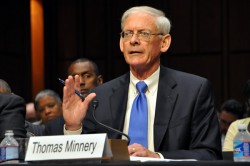
Tom Minnery, vice president of public policy for Focus on the Family (Washington Blade photo by Michael Key)
“It is a strong and dramatically consistent finding in the social science, psychological and medical literature that children do best when living with their own married mother and father,” Minnery said.
In his testimony, Minnery cites a December 2010 study from the Department of Health & Human Services which he said found “children living with their own married biological or adoptive mothers and fathers were generally healthier and happier, had better access to health care, less likely to suffer mild or severe emotional problems, did better in school, were protected from physical, emotional and sexual abuse and almost never life in poverty, compared with children in any other family form.”
Sen. Al Franken (D-Minn.) challenged Minnery’s assertion, saying the HHS report “actually doesn’t say what you said it says.”
“It says that nuclear families — not opposite-sex married families — are associated with those positive outcomes,” Franken said. “Isn’t it true, Mr. Minnery, that married same-sex couple that has or had adopted kids would fall under the definition of the nuclear family in the study that you cite?”
Minnery replied that he would believe the study means nuclear families are families with opposite-sex parents, but Franken denied this speculation, saying, “It doesn’t,” eliciting laugher from those attending the hearing.
“The study defines nuclear family as one or more children living with two parents who are married to one another and each biological or adoptive parents of all the children in the family,” Franken said. “And I, frankly, don’t really know how we can trust the rest of your testimony if you are reading studies these ways.”
Rea Carey, executive director of the National Gay & Lesbian Task Force, said following the hearing the testimony of those affected by DOMA compared to apparently misleading testimony of the anti-gay law’s proponents shows why “we’re winning on this issue.”
“The families who spoke — they talked from their human experience,” Carey said. “The other side talked from technical matters, from research that actually didn’t reveal the true, full research. We’re actually — children are doing quite well in our families, thank you very much.”
Time for a markup?
Now that the Respect for Marriage Act has had a hearing in the Senate, one option to move the legislation would be to hold a markup to bring the legislation to the floor. All 10 Democrats on the committee have signaled support for the legislation, so the bill already has sufficient support to move forward.
A Senate Democratic aide, who spoke on condition of anonymity, said the committee has yet to set a date to report out the legislation to the Senate floor.
“This hearing began to build the record for repealing DOMA, and this is the beginning of the process,” the aide said. “Sen. Leahy will continue to work with Sen. Feinstein and other supporters, and hopes there will be support from both sides of the aisle for this repeal, but I have no announcements to make today concerning any kind of timeline.”
Jacobs said he wants to see more co-sponsors for the Respect for Marriage Act — and maintained he wants “all Democrats on board” — but said the time may be right for a markup on the bill.
“I think that we should move to that pretty quickly,” Jacobs said. “I’d like to see it. I know some people don’t, but I think we need to keep the momentum going.”
Following the hearing, Solmonese expressed caution about moving to a markup and deferred the decision to the Senate Judiciary Committee leadership.
“If we are genuinely committed to a clare path to victory, to ensuring that DOMA is repealed, then I would defer to the chairman in terms of the degree to which he thinks the time is appropriate for a markup — and how that relates to a full Senate vote and the prospects in the House,” Solmonese said. “As was the case with ‘Don’t Ask, Don’t Tell,’ as was the case with any legislative victory that we have seen through to the end, we never want to evaluate it on the merits of one action.”
Bonauto, who’s leading several lawsuits against DOMA in the federal courts, said she isn’t sure if a committee vote on DOMA repeal — or a floor vote in the Senate without action in the House — would have any effect on how the courts would evaluate the constitutionality of the anti-gay law. She cautioned that a symbolic victory in the Senate may not have the desired impact on the courts.
“It’s hard to predict,” Bonauto said. “In the 1970’s, when the Congress had approved of the Equal Rights Amendment and sent it up for ratification to the states, the Supreme Court stayed its hand and didn’t declare that gender was a suspect classification because it thought the issue was moving through the political process. I think we’ve all learned through of the failure of ratification of the ERA that because something has been approved by the Congress of even is a constitutional amendment is set forth for ratification, it doesn’t predict future results.”

The Comings & Goings column is about sharing the professional successes of our community. We want to recognize those landing new jobs, new clients for their business, joining boards of organizations and other achievements. Please share your successes with us at [email protected].
Congratulations to Gil Pontes III on his recent appointment to the Financial Advisory Board for the City of Wilton Manors, Fla. Upon being appointed he said, “I’m honored to join the Financial Advisory Board for the City of Wilton Manors at such an important moment for our community. In my role as Executive Director of the NextGen Chamber of Commerce, I spend much of my time focused on economic growth, fiscal sustainability, and the long-term competitiveness of emerging business leaders. I look forward to bringing that perspective to Wilton Manors — helping ensure responsible stewardship of public resources while supporting a vibrant, inclusive local economy.”
Pontes is a nonprofit executive with years of development, operations, budget, management, and strategic planning experience in 501(c)(3), 501(c)(4), and political organizations. Pontes is currently executive director of NextGen, Chamber of Commerce. NextGen Chamber’s mission is to “empower emerging business leaders by generating insights, encouraging engagement, and nurturing leadership development to shape the future economy.” Prior to that he served as managing director of The Nora Project, and director of development also at The Nora Project. He has held a number of other positions including Major Gifts Officer, Thundermist Health Center, and has worked in both real estate and banking including as Business Solutions Adviser, Ironwood Financial. For three years he was a Selectman, Town of Berkley, Mass. In that role, he managed HR and general governance for town government. There were 200+ staff and 6,500 constituents. He balanced a $20,000,000 budget annually, established an Economic Development Committee, and hired the first town administrator.
Pontes earned his bachelor’s degree in political science from the University of Massachusetts, Dartmouth.
Kansas
ACLU sues Kansas over law invalidating trans residents’ IDs
A new Kansas bill requires transgender residents to have their driver’s licenses reflect their sex assigned at birth, invalidating current licenses.

Transgender people across Kansas received letters in the mail on Wednesday demanding the immediate surrender of their driver’s licenses following passage of one of the harshest transgender bathroom bans in the nation. Now the American Civil Liberties Union is filing a lawsuit to block the ban and protect transgender residents from what advocates describe as “sweeping” and “punitive” consequences.
Independent journalist Erin Reed broke the story Wednesday after lawmakers approved House Substitute for Senate Bill 244. In her reporting, Reed included a photo of the letter sent to transgender Kansans, requiring them to obtain a driver’s license that reflects their sex assigned at birth rather than the gender with which they identify.
According to the reporting, transgender Kansans must surrender their driver’s licenses and that their current credentials — regardless of expiration date — will be considered invalid upon the law’s publication. The move effectively nullifies previously issued identification documents, creating immediate uncertainty for those impacted.
House Substitute for Senate Bill 244 also stipulates that any transgender person caught driving without a valid license could face a class B misdemeanor, punishable by up to six months in jail and a $1,000 fine. That potential penalty adds a criminal dimension to what began as an administrative action. It also compounds the legal risks for transgender Kansans, as the state already requires county jails to house inmates according to sex assigned at birth — a policy that advocates say can place transgender detainees at heightened risk.
Beyond identification issues, SB 244 not only bans transgender people from using restrooms that match their gender identity in government buildings — including libraries, courthouses, state parks, hospitals, and interstate rest stops — with the possibility for criminal penalties, but also allows for what critics have described as a “bathroom bounty hunter” provision. The measure permits anyone who encounters a transgender person in a restroom — including potentially in private businesses — to sue them for large sums of money, dramatically expanding the scope of enforcement beyond government authorities.
The lawsuit challenging SB 244 was filed today in the District Court of Douglas County on behalf of anonymous plaintiffs Daniel Doe and Matthew Moe by the American Civil Liberties Union, the ACLU of Kansas, and Ballard Spahr LLP. The complaint argues that SB 244 violates the Kansas Constitution’s protections for personal autonomy, privacy, equality under the law, due process, and freedom of speech.
Additionally, the American Civil Liberties Union filed a temporary restraining order on behalf of the anonymous plaintiffs, arguing that the order — followed by a temporary injunction — is necessary to prevent the “irreparable harm” that would result from SB 244.
State Rep. Abi Boatman, a Wichita Democrat and the only transgender member of the Kansas Legislature, told the Kansas City Star on Wednesday that “persecution is the point.”
“This legislation is a direct attack on the dignity and humanity of transgender Kansans,” said Monica Bennett, legal director of the ACLU of Kansas. “It undermines our state’s strong constitutional protections against government overreach and persecution.”
“SB 244 is a cruel and craven threat to public safety all in the name of fostering fear, division, and paranoia,” said Harper Seldin, senior staff attorney for the ACLU’s LGBTQ & HIV Rights Project. “The invalidation of state-issued IDs threatens to out transgender people against their will every time they apply for a job, rent an apartment, or interact with police. Taken as a whole, SB 244 is a transparent attempt to deny transgender people autonomy over their own identities and push them out of public life altogether.”
“SB 244 presents a state-sanctioned attack on transgender people aimed at silencing, dehumanizing, and alienating Kansans whose gender identity does not conform to the state legislature’s preferences,” said Heather St. Clair, a Ballard Spahr litigator working on the case. “Ballard Spahr is committed to standing with the ACLU and the plaintiffs in fighting on behalf of transgender Kansans for a remedy against the injustices presented by SB 244, and is dedicated to protecting the constitutional rights jeopardized by this new law.”
National
After layoffs at Advocate, parent company acquires ‘Them’ from Conde Nast
Top editorial staff let go last week

Former staff members at the Advocate and Out magazines revealed that parent company Equalpride laid off a number of employees late last week.
Those let go included Advocate editor-in-chief Alex Cooper, Pride.com editor-in-chief Rachel Shatto, brand partnerships manager Erin Manley, community editor Marie-Adélina de la Ferriére, and Out magazine staff writers Moises Mendez and Bernardo Sim, according to a report in Hollywood Reporter.
Cooper, who joined the company in 2021, posted to social media that, “Few people have had the privilege of leading this legendary LGBTQ+ news outlet, and I’m deeply honored to have been one of them. To my team: thank you for the last four years. You’ve been the best. For those also affected today, please let me know how I can support you.”
The Advocate’s PR firm when reached by the Blade said it no longer represents the company. Emails to the Advocate went unanswered.
Equalpride on Friday announced it acquired “Them,” a digital LGBTQ outlet founded in 2017 by Conde Nast.
“Equalpride exists to elevate, celebrate and protect LGBTQ+ storytelling at scale,” Equalpride CEO Mark Berryhill said according to Hollywood Reporter. “By combining the strengths of our brands with this respected digital platform, we’re creating a unified ecosystem that delivers even more impact for our audiences, advertisers, and community partners.”
It’s not clear if “Them” staff would take over editorial responsibilities for the Advocate and Out.
-

 Federal Government4 days ago
Federal Government4 days agoTwo very different views of the State of the Union
-

 Virginia5 days ago
Virginia5 days agoVa. activists preparing campaign in support of repealing marriage amendment
-

 Opinions4 days ago
Opinions4 days agoThe global cost of Trump’s foreign aid ideology
-

 Opinions3 days ago
Opinions3 days agoCriteria for supporting a candidate in D.C.

